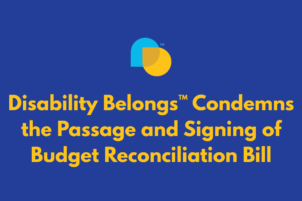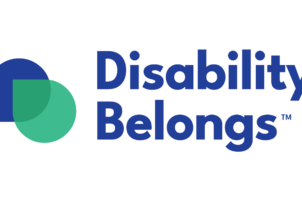Washington, D.C., March 26 – Last night Senate leaders voted unanimously to move forward on the $2 trillion-dollar emergency stimulus bill meant to help our nation respond to the COVID-19 pandemic. The bill, originally called the Coronavirus Aid, Relief, and Economic Security Act (CARES Act), now goes to the House of Representatives for a vote. If passed, then it will go to the President’s desk to become law.
You can read more about the bill on the Senate Appropriations Committee website HERE.
However, what does this mean for the millions of Americans living with disabilities? What provisions will specifically impact or help the disability community? What help is there for actual people with disabilities who are uniquely at-risk to the impact of the virus?
RespectAbility and a host of other disability advocacy organizations have been working around the clock to answer these questions for the past several days. Those that lobby have been fighting hard to include key provisions into the law that will help the more than 56 million Americans with disabilities.
These efforts resulted in 12 explicit references to disabilities/people with disabilities in the final text of the bill, which can be accessed online. They are on pages 186-187, 192-193, 330-331, 741-742, 759-760 and 870-871.
How will this bill help me as an individual with disabilities?
The most direct way that the CARES Act will help individuals with and without disabilities who are struggling right now is through recovery rebates for individuals. This will be a one-time cash payment sent from the government to all U.S. residents who are not a dependent of another taxpayer, and have a Social Security Number with adjusted gross income up to $75,000 ($150,000 if you are married), with a phaseout for incomes between $75,000 and $99,000, ($150,000-$198,000 if you are married).
The amount of that check will be $1,200 for eligible individuals and $2,400 for people who are married, plus $500 per dependent child. This is being characterized as a rebate, which means it will NOT be counted against the asset limits faced by people with disabilities if spent within 12 months of receipt.
However, as it is currently crafted, people with disabilities who are on Supplemental Security Income (SSI) will have to file their taxes. This could create a major burden for many of the poorest people with disabilities and other low-income communities, many of whom will find access to filling out the forms a challenge. See page 144 of the bill for more details.
Disability organizations already are preparing to push for clarity and guidance from the government on this issue.
How will this bill impact workers with disabilities and others who may have lost their jobs?
This bill includes major changes and supports for the unemployment insurance (UI) system under the U.S. Department of Labor (DOL). Unemployed workers with and without disabilities will receive $600 increase in the weekly checks. The bill also creates a Pandemic Unemployment Assistance (PUA) that expands UI coverage. Critically that coverage has been expanded to include self-employed workers, gig workers and independent contractors.
This is great news for many people with disabilities who engage in the gig economy, drive for Uber, or run their own small businesses.
The bad news is that the Pandemic Unemployment Compensation only extends to July. Given the uncertainties of the virus and the economy, whether that will be enough time remains an open question.
It also is unclear how this will play out in individual circumstances. We were contacted by an individual who currently works part time at income level that allows him to continue to collect SSI and/or SSDI. Interestingly, the bill passed by the Senate adds $600 per week to the unemployment payment regardless of the amount of the lost income, and so he is rightfully concerned that if he follows the instructions from his job, from which he was just furloughed, and files for unemployment, he will lose these important benefits because his income from unemployment will be too high.
As the House still needs to pass its version of the bill before being sent to the President for signature, we hope that this seemingly unintended result, as well as other confusions, will be resolved in conference. RespectAbility will keep you up-to-date.
How will this bill help caregivers or people who need paid sick leave?
Unfortunately, this bill does not include any additional provisions to help workers who do not already receive paid sick leave or who are now receiving sick leave through the earlier Families First Coronavirus Response Act.
People with disabilities must know they are secure in this time of crisis. Thus, further advocacy is needed to cover these gaps in coverage and ensure that family members who need to take leave in order to meet the critical needs of their loved ones are covered.
How will this bill impact students with disabilities who are now learning from home?
Teachers and special educators are facing significant challenges around how to provide a free, appropriate public education to students with disabilities when you can only connect through a computer screen. The bill will give states more than $30 billion dollars to provide Emergency Education Relief grants to help teachers and students with and without disabilities to make the switch to online learning and virtual classrooms. See pages 192 and 193 for more details.
These grants will specifically help teachers meet the needs of students with disabilities in these trying times. Likewise, some of those funds can be used to provide summer learning, supplemental after-school programs and online learning for students with disabilities. Details on pages 759-760.
Disability advocates had been very concerned that the original bill included several provisions waivers from the explicit requirements of laws such as Individuals with Disabilities Education Act (IDEA). The new version of the bill requires the Secretary of Education to report to Congress within 30 days about where, how and why waivers are being used and students with disabilities are accessing online learning. See pages 741 and 742 for more details.
How will this bill help organizations serving people with disabilities?
The bill would specifically distribute $955 million for Aging and Disability Services Programs under the mandate of the Administrative on Community Living (ACL). That money will go to support nutrition programs providing people with disabilities and older Americans with food deliveries as well as direct support for family caregivers.
That amount also includes $50 million dollars for aging and disability resource centers across the country as well as $85 million dollars for Centers for Independent Living (CILs). Pages 330 and 331for those interested. Further, the bill invests $15 million to support housing specifically for people with disabilities.
Addressing the critical issue of Direct Support Professionals (DSPs) who help people with disabilities, the CARES Act crucially will now allow state Medicaid programs to pay for DSPs to help people with disabilities who end up in the hospital. This should provide some reassurance for people with disabilities who need support for activities of daily living, but many other needs regarding DSPs and maintenance of the DSP workforce through this crisis remain unaddressed.
What is missing from the bill?
The CARES Act does not address the life or death issue of medical rationing facing the disability community in this moment of crisis. As the crisis intensified in Italy, the government rationed healthcare away from people with disabilities. This approach already is illegal under American law, but it still happens, nonetheless. In this time of crisis, the state and local leaders making on the ground decisions need to hear a clear message about treating people with disabilities equally.
Lastly, the bill does nothing to support some of the most vulnerable people with disabilities in America today. The bill contains no mention whatsoever about immigrants (with or without disabilities) or people who are incarcerated. Census Bureau data shows that there are more than 44 million immigrants living in the United States and out of that number, up to 6 million are probably living with a disability. How are they going to be helped or harmed by this bill? There are no clear answers yet. Likewise, there is no relief or support for the estimated 750,000 people with disabilities who are currently imprisoned.
In the meantime, the staff at RespectAbility will continue monitoring this situation and encourage you to make your voices heard to your elected officials. If you have specific questions about this Bill, please email or call your members of Congress. Locate your U.S. senators’ contact information and find your U.S. representative’s websites.
If you would like to know more about how COVID-19 is impacting the disability community, we encourage you to review and make use of the following resources and materials:
RespectAbility will continue to provide updates and insights on these issues at www.respectability.org/covid-19.









SSI receipeants should have received $1,000 or $1,200 in stimulus. That amount would not have pushed them over the asset limit. The poorest of the poor will get absolutely nothing. What is wrong with people in this country. The disabled, that are not able to work, are the most forgotten and most unrepresented people amongst us.
Thank you, as I think that is me… 😢
THIS IS SO WRONG CONGRESS ACT LIKE WE DONT USE THE LITTLE MONEY WE HAVE LEFT OVER AFER WE PAY OUR BILLS DONT GO BACK INTO SOCIETY WE GO TO THE GROCER STORE SHOE STORE RESTAUANTS OR PAY TAXES ON A BAG OF POTATOES CHIPS. WE ARE DESERVING OF THE SAME JUST LIKE EVERYONE ELSE. WHAT IS WRONG WITH CONGRESS? HOW DO THEY EXPECT THE ECONOMY TO GO UP IF THEY DONT GIVE PEOPLE WIHT DISABILITIES A STIMULUS CHECK WE ARE DESERVING ALSO.AND IF THEY DONT FEEL WE NEED OR DESERVE THE STIMULUS CHECK QUIT CHARGING ME TAXES ON EVERYTHNG I BUY FROM THIS POINT FORWARD. SINCE OUR LITTLE MONEY OR I DOESNT MATTER TO THE UNITED STATSES. SHIT IM STUCK IN THE HOUSE ALSO IM HELPING TRYING TO KNOCK OUT THIS COVID19.
WHAT HAPPEN TO WE ARE#ALLINTHISTOGETHER.
#EXCEPT WHEN IT COMES TO STIMULUS CHECKS.
#WAIT TIL NOVEMBER ELECTION TIMES THAN LETS SEE HOW IMPORTMANT WE ARE.
#2020 NO STIMULUS NO VOTE!!!!!!!!!!!!!
The services that people with disabilities receive will continue to be supplied and paid for by the state agencies as they have always been. I don’t see the expenses for this group of people increasing due to this horrible world wide experience. I work with this group of people and they are receiving the best of care, though maybe somewhat modified in an effort to ensure they stay healthy. As far as all the illegal immigrants with disabilities go, I would much prefer that my hard earned income be given to all our veterans with disabilities caused by what they needed to do to protect our lifestyles, both yours and mine and the freedom for all of us to have our opinions.
I am 50 and am an SSDI recipient. My 27 year old daughter and I live together. She makes minimum wage. I did her taxes this year and since she paid more than 50 percent (very very little over the 50 percent) and we lived together 12 months out of the year. Since I tried to help her get a better refund since we’re very low income, now I am not eligible for a stimulus check. They should change the definition for head of household and dependent since this has brought to light that there is a big difference between supporting an older parent and those in my similar situation.
I am on SSDI, get Medicare, which is my primary ins and Mi. Medicaid is my secondary insurance that pays my monthly premiums, ECT.I have to pay copymts on all my scripts/meds every month. I get 194.00 in snap benefits for food. As of Jan, I received a 14.00 increase in my SSDI, which now I get $868.00 per month. My rent was increased by 25.00 for now(625.00) for a small 2bdrm 790 square foot house, but my landlady wanted to increase it by 120 this past Feb. But I told her there’s no way I can pay that. I also pay all utilities incl. Water/sewerI had to sign a new 6 month lease and she is suppose to raise it in July or Aug, possibly by 75-100.00 My landlord passed away in Nov(her husband) so she is now increasing tenants rents. I was told that my SSDI is too high to qualify for SSI. Now when Aug comes, I don’t know what I’m going t o do. I am in no condition to move/ pack. I have Severe SLE, DLE Sjogrens, fibromyalgia, failed lumbar fusion, herniated. Disks in cerv.spine, partial rotator cuff tear, arthritiss , to name a few. There are days I can barely do any ADL’s let alone get out of bed. How are people like me suppose to live on 868./month. There should be more help for people like me. It just doesn’t seem right.
Yes so true. Congress needs to wake up. They will not get their.crucial upcoming election votes!
I currently am on SSDI with a representative payee, the idea of not being included in the payments with SSDI recipients is unacceptable. There is nobody we can talk to regarding our stimulus. How can they just overlook us like that? I’m frustrated, anxious and it’s affecting my blood pressure. Who are we supposed to turn to for answers?
I need help immediately, I’m about to lose my home, need help with utilities, my home was broke in while I was out of state and I came to a chaotic distruction. I make $804. Per month but dont get but 668. During to Medicare premium, I’m dam now homeless because I cant be in my home due to my power $1800. To be reconnected…what help can I get?
Yes and they have excluded them again.